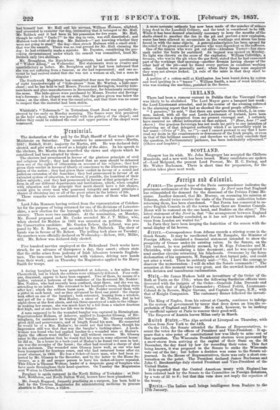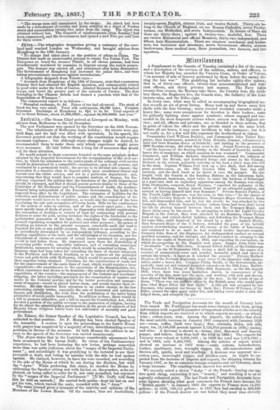Inrrigu Ruh Colurrint.
lrattrt.—The general tone of the Paris correspondence indicates the proximate settlement of the Persian dispute. Le Nord says that England has relinquished the demand for the dismissal of the Persian Prime Minister. Another demand, that Mr. Murray, on resuming his mission at Teheran, should twice receive the visits of the Persian authorities before returning them, has been abandoned. "But Persia has consented to receive-English Consuls in all the towns where there are Russian Consuls. Herat will be restored on the one hand, and Bushire on the other." The latest statement of the Nord is, that "the arrangement between England and Persia is not finally concluded, as it has not yet been signed. Advices from London are waited for."
In Paris they have been keeping the festivities of the season with the usual display of fat beeves. arm T.—Correspondence from Athens records a stirring scene in the Greek Senate. It may be recollected that M. Rangabe, tho Minister of Foreign Affairs, circulated a financial statement intended to show the prosperity of Greece under its existing rulers. In the Senate, on the 12th instant, he was publicly accused, by M. Riga Palamides and M. Christides, with. circulating a false document ; and he was required to send another circular retracting his falsehoods. Overcome by the fierce declamation of his opponents, M. Rangabe at first turned pale, and could not utter a word. Then he suddenly said—" Sir, I have the courage to disavow the memorandum : I will do what the Senate commandsl ' The sensation at this moment was very great, and the crowded house echoed with derision and tumultuous exclamations.
Sift111.—Sir James Hudson held an investiture' of the Order of the Bath at Turin on the 17th; when the following-Sardinian officers -were decorated with the insignia of the Order—Generals John Durando and Trotti, with that of Knight Commander--, Petitti, LieutenantColonel de la Revere, Major Gavone, and Captain di Negro, uN., with that of Knight Companion. The customary dinner followed the investiture.
The King of Naples, from his retreat at Caserta, continues to indulge in the system of government by terror that drew down on him llte reprobation of England and France. He is said, however, to be 'seeking by unofficial agency at Paris to recover their good-will.
The Emperor of Austria leaves Milan early in March.
Statts.—The Alps arrived at Liverpool on Thursday, with advices from New York to the 14th, On the 11th, the Senate' attended the House of Representatives, to count the votes for the offices of President and Vice-President. It appears that a nice point of constitutional law was likely to arise out of that operation. The Wisconsin Presidential electors were prevented by a snow-storm from arriving at the capital of their State on the 3d December, the day fixed by law for recording their votes. This fact being known, it was proposed in the Senate to strike the Wisconsin vote out of the list ; but before a decision was come to the Senate adjourned. In the House of Representatives, there was only a short conversation on the point. The President declared James Buchanan and John C. Breckenridge duly elected President and Vice-President of the United States.
It is reported that the Central American treaty with England has been referred back by the Senate to the Committee on Foreign Relations, by a vote of 33 to 8; but that this vote does not imply the rejection of the treaty.
10 us i a.—The Indian mall brings intelligence from Bushire to -the 17th January.
"The troops were still unmolested by the enemy. An attack had been made by a detachment of cavalry and horse artillery on a depot of Persian stores and ammunition twenty-two miles from the camp. Inc object was attained without loss. The despatch of reinforcements [from Bombay] hail been commenced, and the Government had opened a new Five per cent loan for three crores."
eilIt1.—The telegraphic despatches giving a summary of the overland mail reached London on Wednesday, and brought advice.s from Hongkong to the 15th January. "so change had taken place in the position of affairs in China. The Chinese had made an unsuccessful attempt to retake Tea Totum Fort. The
Europeans on board the steamer Thistle' in all eleven had been treacherously murdered by assaasins in disguise among the native passengers. The steamer was carried, off, and abandoned after being dismantled. The Government of Hongkong had increased the police force, and were taking precautionary measures against incendiarism.',
A telegraphic despatch from Trieste says " Accounts from Hongkong, of the lath of January, state that a numerous Chinese fleet had attacked the English squadron, and subsequently retired in good order under the forts of Canton. Admiral Seymour had disembarked troops, and burnt the greater part of the suburbs of Canton. The fleet belonging to the Chinese Rebels had formed a junction with that of the Imperialists at Whampoa." The commercial report is as follows " Shanghai exchange, 6s. 8d. Prices of tea had advanced. The stock of black tea was very small. Total silk settlements, 68,000 bales. Freights depressed. Exchange at Hongkong 4s, Std. to 48, 9d, Total exports of tea to Great Britain, about 41,000,000lb., against 54,000,000lb. last year."
1.115irttli a.—The Ocean Chief arrived at Liverpool on Monday, with advices from Melbourne to the 2d December.
The new Parliament was opened by the Governor on the 25th November. The inhabitants of Melbourne made holiday ; the streets were gay with flags, and the hall was filled with spectators. In his speech, the Governor pointed out that the working of the constitution would require incessant vigilance ; but although many changes might be desired, he recommended them to make those only which experience might prove were necessary. He laid before them a long list of measures that would call for their attention.
He would submit to them a measure founded on the same principle at that adopted by the Imperial Government for the reorganization of the civil service, by which the admission to the junior grade of the ordinary civil service would be determined by a competitive examination' open to all persons, and conducted by a permanent board ; the service to be divided into classes ; the promotion to a superior class to depend solely upon ascertained fitness and extend over the entire service, and not in a particular department : and, announcing that they would have to consider matters of finance, his Excellency expressed his opinion that the functions of the Audit Department should be enlarged, and that it should possess powers similar to those of the Controller of the Exchequer and the Commissioners of Audit, the AuditorGeneral being independent of the Executive Government, but liable to be removed from office by the Legislature. The extension of facilities for the collection and disbursement of public monies and the consolidation of departments would have to be considered, as would also the repeal of the laws regulating the sale and occupation of Crown lands. Bills for the continuance of the system of sales by auction, and of the present upset price ; for the more speedy issue of deeds of grant, by dispensing with double registration; the concession of facilities to owners of land for contracting with persons desirous to mine for gold, saving inviolate the rights of the freeholder to the undisturbed possession of his land ; the rescinding the existing orders in Council regulating occupation for pastoral and other purposes the power of granting an interest to the present occupant, renewable until the land is required for sale or any. Imam purpose, but subject to an acreable rent, to be periodically determined by an independent tribunal, according to the grazing capabilities of the land, and the advantages of its situation, and the adjustment of chums on account of actual losses sustained by occupants, would be laid before them. He impressed upon them the desirability of promoting public works, especially railways, and of extending municipal mstitutions, measures for securing which would be submitted to them. Preliminary steps had been taken for extending the lines of electric telegraph to the Northern and Western frontiers, so as to connect all the principal towns and gold-fields with Melbourne; which would be proceeded with upon their sanction being obtained. Provision for the construction of roads and for the improvement of the main lines of road, which would require a large expenditure—the amendments in the operations of the Municipalities Act, which experience had shown to be desirable—the subject of the agricultural capabilities of the country—the management of the customs and merchantshipping, the latter including provision for the examination of masters and mates in the Colonial marine, and for the better protection and management of seamen—would be placed before them, and would require their attention. He also directed their attention to an entire change in the law restraining certain trades, especially the sale of fermented and spirituous liquors and distillation, the evils from the prohibition of the latter being productive of much public immorality. In addition to these, there would be a bill to promote education, and a bill to amend the Constitution Act, which devoted a portion of the public revenue to the promotion of religion, having
for its object the admitting to i
a participation n the grant all subjects of her Majesty whose religious. tenets were not subversive of morality and good government.
Dr. Palmer, the former Speaker of the Legislative Council, has been
reelected to that position. Dr. F. Murphy has been elected Speaker of the Assembly. A motion to open the proceedings in the Lower House with prayer wasnegatived by a majority of two, notwithstanding several petitions in favour of the measure. In both Houses the addrese in answer to the speech of the Governor was carried unanimously.
The Argus states that in the Legislature considerable amusement had been occasioned by Mr. GaVall Duffy. By virtue of his Parliamentary experience, he had been lecturing the raw levies, perhaps somewhat more than was quite judicious, about the "usages of the Imperial Parliament"; and accordingly it was gratifying to the lectured to see their preceptor at fault, and voting by mistake with the side he had spoken against. He claimed, however, to have his vote recorded, not according to the side of the House at which he sat during the division, but with the "Ayes:" While preferring this claim, he startled the House by addressing the Speaker sitting and with his hat on, the practice, as he explained, on being called to order for it, not only permitted, but enjoined by the "usages of the Imperial Parliament' [if Mr. Duffy told them this he told an untruth.] He carried both points—kept his hat on and 4ot his vote, which turned the Beale, recorded with the "Ayes."
The same journal gives a synopsis of the nativity and opinions of the Members of the Lower House. Of the number, four are Australians,
twenty-seven‘English, sixteen Irish, and twelve Scotch. Thirty-six belong to the Church of England, six are Roman Catholics, seven Presbyterians, one Methodist, and seven Independents. In favour of State aid there are thirty-three ; against it twenty-two ; doubtful, four. There are twelve Ministerial and official Members, thirty-two independent, and fifteen Anti-Ministerialists. There are nineteen merchants and tradesmen, ten barristers and attorneys, seven Government officers, sixteen landowners, three medical men, three journalists, two fanners, and two squatters.



































 Previous page
Previous page